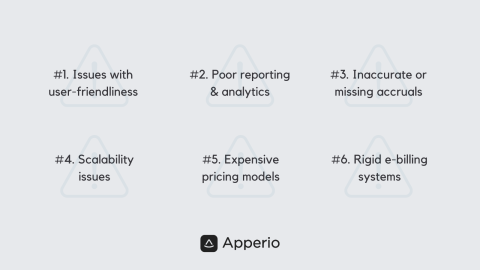6 signs you've outgrown your e-billing system

E-billing systems are one of the older approaches to improving legal spend management, offering a streamlined alternative to outdated paper or email methods. But if you’re a growing business, it’s only natural that your technology needs are evolving. If your current system fails to keep up, your growth potential is limited.
With comprehensive legal spend management software, you can go one step further with automated invoicing, advanced reporting and more. The result? Real-time invoice tracking, reduced administrative burdens, improved cash flow, and ensured compliance with industry standards.
With all that in mind, here are 6 signs you have outgrown your current e-billing system:

Sign 1: Issues with user-friendliness and dated UIs ⚠
If your e-billing system feels like it's fighting you every step of the way, something's got to give. Otherwise, you are likely to experience frustrated users and a hit to productivity and efficiency.
Why user-friendliness matters
- Productivity plummets: When your team is wrestling with a complex dated interface, everything slows down. More time navigating the system means less time actually getting things done. The result? Longer billing cycles and inflated operational costs.
- Increased training costs: A system that's hard to use often means more training—and we're not talking about a quick tutorial. We're talking about extensive, time-consuming sessions that eat into your budget and pull your team away from their actual work. It's like paying to create a problem and then paying again to solve it.
- Frustrated staff: Nothing kills morale faster than a system that looks like Windows 95 and feels like it's working against you. When your team is constantly battling with unfriendly tech, frustration builds. Over time, this can lead to higher turnover and a less engaged workforce.
Sign 2: Poor reporting and analytics ⚠
Let's talk numbers—or rather, the lack of them. With accurate and insightful reporting and analytics you’re better placed for effective financial management and strategic decision-making. If your e-billing system isn't giving you the insights you need, it can severely limit your ability to control legal spend and make informed decisions.
Why good reporting matters
- Can’t see spending patterns: Without detailed reports, it’s difficult to see where your legal budget is going. This blind spot can lead to overspending, missed savings opportunities, and inefficient allocation of resources.
- Budget guesswork: Trying to plan your budget without reliable data? That's a recipe for financial chaos. Poor reporting can leave you struggling to predict costs accurately, putting you at risk of budget overruns and financial instability.
- Decision-making in the dark: When you're short on solid analytics, you're missing the critical insights needed to make informed decisions. This can lead to strategies that miss the mark, overlook efficiency gains, and ultimately, hit your bottom line.
Sign 3: Inaccurate or missing accruals ⚠
If your e-billing system relies on manual processes or email-chasing for automation, especially when estimating accruals, it exposes your finance team to inaccurate forecasts–putting your business at risk.
What inaccurate or missing accruals look like
- Manual data entry inaccuracies: Your law firms even if reminded by an automated email will be inputting accruals data by hand, eating up time and increasing the chance of errors.
- Frequent missing accruals: Even with automated email chasers, law firms still need to manually enter accruals, leading to frequent omissions.
-
Accrual estimates and delays: Law firms often use high-level estimates with built-in buffers, which are outdated by the time they reach the e-billing system.
What this means for your team
- Time delays: Receiving accruals data late when it's always out of date is a significant pain for legal ops and finance. Your auditors aren't going to be impressed either!
- Error central: Manual processes are prone to mistakes, which leads to costly disputes, overpayments, or underpayments—not great for your financial accuracy.
- Frustration all around: Both your internal teams and external legal vendors can get fed up with the “automated” chasing inefficiencies, potentially straining relationships and disrupting service.
Sign 4: Scalability issues ⚠
As you grow and mature, adding more complex work, and more users, it should be right there with you, handling everything smoothly.
Why your e-billing system needs to grow with you
- Performance issues: When your e-billing system suffers from slow processing, crashes, and glitches it can disrupt your billing processes and lead to payment delays.
- Unable to handle increased workloads: As your legal needs expand, a system that can't scale might struggle to handle the flood of invoices and complex billing structures. This can lead to errors and inefficiencies that can affect your financial health.
- The constant upgrade cycle: If your system can't grow with you, you might find yourself shopping for a new one every time you grow. And, of course, this incurs the same time and cost hits as when you implemented the previous system, right at your busiest time.
If these signs sound familiar, you are probably now primed for the solution. So let’s look at how you can fix all this with modern legal spend management software—the replacement for e-billing software.
Sign 5: Expensive pricing models ⚠
An e-billing system that uses 'invoice volume' or 'spend over time' can become too expensive to maintain.
What’s at stake with broken pricing models
- Limiting the spend you manage, losing that control: If your e-billing tool is budgeted, but costs rise as you receive more invoices or your legal spend increases, you may find yourself unable to process all expenses—forcing some outside the e-billing system. This means some spend will go unchecked and then you lose control of all of your legal spend.
- Unsustainability of increasing fees: Licensing models based on metrics that are likely to grow over time can put you in the uncomfortable position of needing to request additional budget for your e-billing tool. This is far from ideal and could lead to budgeting problems and potential embarrassment.
Sign 6: Rigid e-billing systems ⚠
If you can't tweak your system to match your unique needs—across workflows, reporting and compliance—you're probably struggling to manage legal spend effectively.
Why customization matters in legal billing
- Inability to meet exact needs: If your e-billing system is too rigid, it might not accommodate your specific billing structures, approval workflows, or report formats. The result? More manual work and less efficiency—not exactly what you're aiming for.
- Workflow workarounds: When your system can't adapt to your processes, your team might resort to creative (and time-consuming) workarounds. This can slow things down, increase errors, and put a damper on productivity.
-
Falling behind the competition: You need to be able to pivot quickly to meet client demands, keep up with regulations, and stay on top of your strategic goals.
Where modern legal spend management software comes in
New technology, like Apperio, offer solutions to overcome the limitations of older e-billing systems. By adopting a modern e-billing and spend management tool, your firm can address inefficiencies, and shortfalls, and better manage legal spend.
What modern e-billing systems offer:
- Better user experience: These systems have a modern design and are built specifically to be easy to adopt and use.
- Fact-based accruals: Modern e-billing solutions use real-time data connections to law firm time entry systems giving accurate fact-based accruals data your finance team will love.
- Configuration options: Modern e-billing solutions let you adjust the system to fit your specific needs, whether it's unique workflows, reports, or compliance requirements.
- Improved reporting: Plus, they come with strong reporting and analytics tools. These provide valuable insights into your legal spend, helping with budgeting and decision-making.
- Scalability: These systems can grow with your firm and are designed to be user-friendly, reducing training needs and boosting productivity.
Benefits of upgrading:
- ✅Increased efficiency: Real-time full data automation on accruals reduces risk, and increases speed, and accuracy.
- ✅Better value and budget surety: Improved licensing models and enhanced data sources like tax and accountancy provide more bang for your buck and no need to ask for further budgets.
- ✅Improved decision-making: Advanced reporting provides insights for better financial planning and strategic decisions.
By upgrading to a modern e-billing system, your firm can streamline operations, reduce risks, and make more informed decisions. This ultimately improves how you manage legal spend and supports your firm's growth.
Modernizing legal spend management
If you've noticed any of these seven signs in your current system, it might be time to consider an upgrade. Modern e-billing solutions offer the integration, customization, security, and analytics capabilities needed to streamline your operations and gain better control over your legal spend.
By investing in a more advanced e-billing system, you'll be equipped to handle growth, maintain compliance, and make data-driven decisions that can give you a competitive edge.
Ready to stop outdated e-billing systems from holding you back? Reach your full potential with legal spend management software. Book a demo here today.